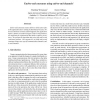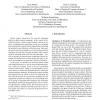35 search results - page 1 / 7 » A New Algorithm to Solve Synchronous Consensus for Dependent... |
PDCAT
2005
Springer
13 years 10 months ago
2005
Springer
Fault tolerant algorithms are often designed under the t-out-of-n assumption, which is based on the assumption that all processes or components fail independently with equal proba...
SRDS
2000
IEEE
13 years 9 months ago
2000
IEEE
The concept of unreliable failure detector was introduced by Chandra and Toueg [2] as a mechanism that provides information about process failures. Depending on the properties the...
PRDC
2006
IEEE
13 years 10 months ago
2006
IEEE
End-to-end consensus ensures delivery of the same value to the application layer running in distributed processes. Deliveries that have not been acknowledged by the application be...
SIAMCOMP
2008
13 years 3 months ago
2008
Abstract. To cope with the impossibility of solving agreement problems in asynchronous systems made up of n processes and prone to t process crashes, system designers tailor their ...
SRDS
2006
IEEE
13 years 10 months ago
2006
IEEE
Failure models characterise the expected component failures in fault-tolerant computing. In the context of distributed systems, a failure model usually consists of two parts: a fu...


